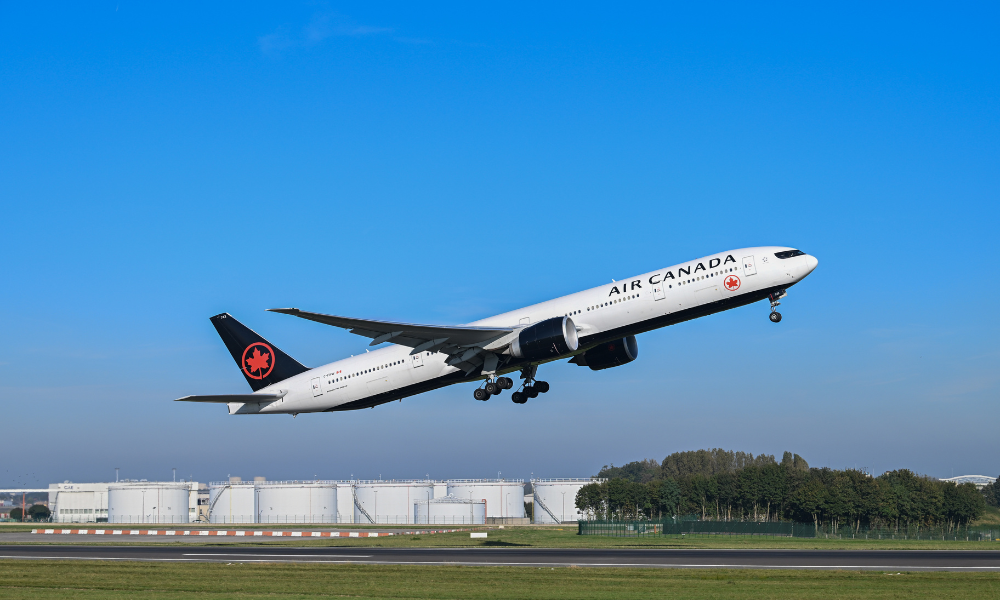Earnings rise as Air Canada boosts outlook, launches buyback, and navigates pilot negotiations

Air Canada recently disclosed its financial results for the third quarter of 2024, highlighting strong profitability, a share buyback program, and an adjusted outlook for the full year.
According to BNN Bloomberg, the announcement of the share buyback program and an earnings beat helped push the airline’s stock up by nearly 14 percent, closing at $21.51 on the Toronto Stock Exchange.
In its financial report, Air Canada shared an operating revenue of $6.1bn, down 4 percent from the same period in 2023. Net income rose to $2.04bn, aided by a significant one-time tax recovery of $1.15bn.
Adjusted earnings per share (EPS) stood at $2.57, exceeding market expectations, though lower than the $3.41 reported a year prior. Operating income came to $1.04bn, reflecting a decline from 2023 figures and an operating margin of 17 percent.
Adjusted EBITDA dropped to $1.5bn, with an adjusted margin of 24.9 percent. The airline's capacity increased by 3 percent, though it did not meet the 4-4.5 percent forecast, a shortfall attributed to fleet and scheduling adjustments.
Michael Rousseau, president and chief executive of Air Canada, highlighted the third-quarter performance, stating, “Adjusted EBITDA of $1.5bn and our adjusted earnings per share of $2.57 were both ahead of market expectations.”
He noted the airline’s operational improvements, with on-time performance increasing by eight percentage points over 2023.
He thanked employees for safely transporting nearly 13 million passengers during the quarter, including Canadian athletes to the Paris Olympics and Paralympics.
Air Canada faced a complex operational environment due to ongoing pilot contract negotiations, which created uncertainty and impacted traveller behaviour, according to BNN Bloomberg.
The airline’s passenger volumes fell slightly, with a reported decrease of 0.1 percent, as some customers either delayed or cancelled bookings, while others opted for alternative carriers.
The pilot contract was ultimately resolved with a 42 percent wage increase over four years, which Rousseau noted was achieved without a significant disruption to customers.
Air Canada also adjusted its guidance for the full year, accounting for changes in fuel costs and contractual adjustments.
The airline now expects adjusted EBITDA of approximately $3.5bn, up from its prior forecast of $3.1bn to $3.4bn.
Its anticipated capacity increase has been revised to around 5 percent, down from the previous guidance of 5.5-6.5 percent, while projected adjusted cost per available seat mile (CASM) has been adjusted to a 2 percent increase, lowered from the previous 2.5-3.5 percent range.
Mark Galardo, Air Canada’s executive vice president of Revenue and Network Planning, indicated that capacity adjustments were due to supply chain constraints, aircraft availability, and external geopolitical factors.
He added that the airline is also monitoring potential impacts from increased hotel prices and currency fluctuations that could affect demand, particularly during the winter travel season.
The share buyback program, announced alongside these results, is intended to address shareholder dilution resulting from financing decisions made during the pandemic.
As per BNN Bloomberg, the buyback plan authorizes Air Canada to repurchase up to 10 percent of its outstanding shares, with purchases taking place between November 2024 and November 2025 on the Toronto Stock Exchange or other eligible trading platforms.
Rousseau stated, “This additional step, after paying down our debt and funding our growth, is consistent with our capital allocation roadmap and our strategic plan,” which Air Canada will expand upon at its upcoming Investor Day on December 17.
As reported by BNN Bloomberg, analysts recognized that Air Canada’s earnings outperformed expectations, largely due to cost efficiencies and favourable fuel pricing.
However, the airline anticipates higher costs linked to the recent pilot agreement in 2025, alongside broader market pressures. Despite these challenges, Rousseau expressed confidence in Air Canada’s long-term outlook, noting that demand trends remain positive.
In addition to releasing its quarterly results, Air Canada confirmed it would host an analyst call to discuss the third-quarter report and its forward outlook.



